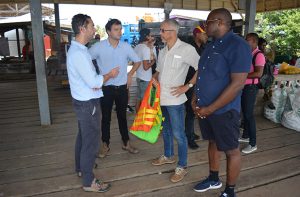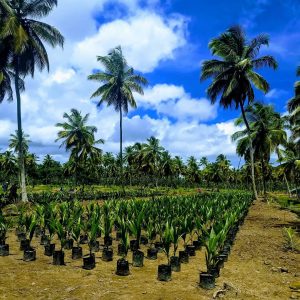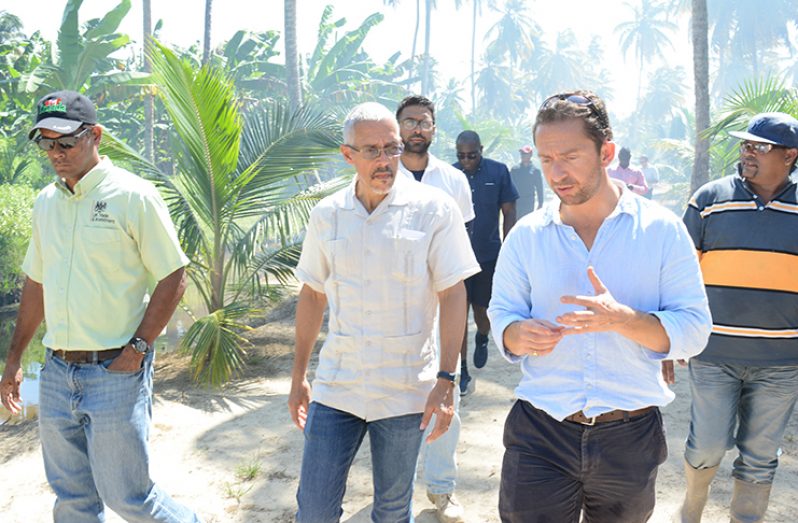– to take advantage of U.S. multi-billion-dollar coconut water market
THE North American coconut water market, it is estimated, will be worth US$6 billion by 2020 and, with an abundance of land, Guyana is uniquely placed to take advantage of this boom, CEO of Pomeroon Trading, Duncan Turnbull said.
On a site visit Wednesday of the Stoll Estate in the Pomeroon River, Minister of Business Dominic Gaskin, in the company of Turnbull, British Member of Parliament (MP) David Lammy, Caribbean Agricultural Research & Development Institute (CARDI) representative, Dr. Cyril Roberts, along with other businessmen and investors, discussed the development and potential of the coconut industry.
“Guyana has coconut farming in its very fabric and the world’s biggest market is on our doorstep. Now is the time to diversify the Guyanese economy. Now is the time to solidify a position as the coconut water supplier to North America. Now is the time to rally this industry into the giant it deserves to be,” Turnbull said.
The British businessman said major rehabilitation of the 700-acre Stoll Estate is ongoing and some of the changes will include building roads, digging drains, planting coconut trees and running intercrop pilot projects.

“As part of our commitment to improving the quality of genetic seedstock in the region, we have established a rapidly expanding coconut seedling nursery. Off the estate, in the community, we focused on projects in education and female empowerment,” he said.
Minister of Business Dominic Gaskin said the coconut industry is an old one, but with the injection of new ideas, pilot projects and new funding, the industry can become a major contributor to Guyana’s economy.
“When there is a processing facility, the operations will scale up and there would be need to attract more investors into the project to carry it to the level where it should be,” Minister Gaskin told the Guyana Chronicle.
He noted that the land which was dense vegetation a few years ago, has now been transformed into something much greater.
The minister noted that apart from the edible by-products, the coconut palm also provides a series of non-food by-products such as activated carbon, shell powder, fibre, charcoal, handicraft, furniture and roofing. It can also be a source of fuel for the rural areas and industries.
Minister Gaskin advised that there is an urgent need for intense research and commercialisation of the technology, so as to provide an additional source of income and to improve the economic status of the farmers and the country.
Dr. Roberts said within recent weeks, representatives of CARDI and other agencies and farmers have been collecting nuts and marketing healthy mother palms.
He explained that the nuts were placed in nurseries built by lead farmers (beneficiaries) with assistance from secondary farmers. It is expected that the secondary farmers will receive a percentage of good seedlings from the lead farmers.

The goal of this aspect of the project is to produce 5,000 coconut seedlings, after which, farmers will be able to continuously supply local demand for planting materials. Of the 10 demonstration nurseries that will be established, four are now operational.
Two of the four nurseries are located in Mahaica, one at Linden and the other at Buxton. Currently, each nursery has about 400 seedlings.
Dr. Roberts explained that once properly managed, these nurseries will be transformed into commercial entities. Following a cost analysis, a price per seedling would be derived; however, the intention is to have farmers pay a fair, stable price per seedling. Many farmers find the present market price per seedling burdensome.
He explained that the establishment of these nurseries allows the beneficiaries to apply theoretical knowledge gained from several training exercises, such as integrated pest management, coconut husbandry and business and nursery management. Further, it presents the opportunity for farmers to improve their livelihoods.











